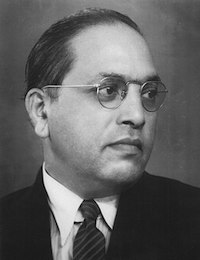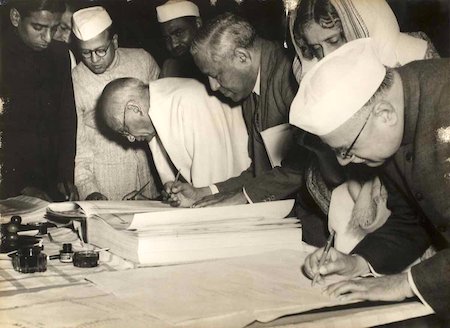
Photo: The Better India >>
Bhimrao Ramji Ambedkar (1891–1956): “Indian jurist, economist, social reformer and political leader who headed the committee drafting the Constitution of India [and] served as Law and Justice minister in the first cabinet of Jawaharlal Nehru” | Wikipedia >>
“The State shall not discriminate against any citizen on grounds only of religion, race, caste, sex, place of birth or any of them.” – Constitution of India & National Human Rights Commission >>
“Religion is a personal matter and should not be politicised.” – Invitation by the Bharat Jodo Abhiyan (BJA) – a civil society platform involving organisations from across 15 states – extended to all like-minded citizens “who take pride in our progressive, inclusive civilization and are committed to our constitutional values of fraternity, liberty, equality and justice” | TheWire (2 January 2024) >>
“The Indian constitution had to empower the state to enter into the realm of Indian society and transform it by eradicating deeply embedded economic, political and social hierarchies.” – “The Foreign and the Indigenous in the Indian Constitution: Constitution Day talk” by Arun Thiruvengadam (Centre for Law and Policy Research, Bangalore, 2 December 2015)
“Tribals are subject to oppression and cruelty even after independence and still picked up by the investigating officers to cover up shoddy investigations. […] The only recourse available to us is to faithfully abide by and give life to the constitutional ideals which Dr Ambedkar helped formulate, and use those to bring transformative change in the minds and perceptions of the society.” – Supreme Court Judge Justice D.Y. Chandrachud (The Wire, 7 December 2021)
Did the Constitution of India borrow ideas and many of its stand out features from the constitutions of other countries?
Yes, after intense scrutiny, it turns out that our founding fathers liberally chose what features to embed into our Constitution and in many cases remoulded them to suit diverse local realities.
“There is nothing to be ashamed of in borrowing. It involves no plagiarism. Nobody holds any patent rights in the fundamental ideas of a Constitution,” said Dr BR Ambedkar, the Chairman of the Drafting Committee,
So, what did our founding fathers borrow from the rest of the world? >>
Source: “Republic Day 2019: 9 Constitutions That Inspired The Ideals That Define Modern India”
URL: https://www.thebetterindia.com/170247/india-constitution-inspiration-acts-rights-ambedkar-republic-day/
Date Accessed: 8 May 2023
Ambedkar had been the champion of freedom, free thinking and liberty whose words are important to be remembered. […]
‘The caste system has recognised slavery in inverse order of status and maintained inequality in every sphere of human activity social, political, economic, legal, religious etc.‘
This insightful quote provides the depth of caste where liberty and equality are antagonistic to the very notion of caste. On another occasion while discussing the reality of being a free human Ambedkar said,
‘he who is not a slave of circumstances and is always ready and striving to change them in his favour, I call him free. One who is not a slave of usage, customs, of meaningless rituals and ceremonies, of superstitions and traditions; whose flame of reason has not been extinguished, I call him a free man. He who has not surrendered his free will and abdicated his intelligence and independent thinking, who does not blindly act on the teachings of others, who does not blindly accept anything without critically analysing and examining its veracity and usefulness, who is always prepared to protect his rights, who is not afraid of ridicule and unjust public criticism, who has a sound conscience and self-respect so as not become a tool in the hands of others, I call him a free man. He who does not lead his life under the direction of others, who sets his own goal of life according to his own reasoning and decides for himself as to how and in what way life should be lead, is a free man.’
Source: Ambedkar’s Insights quoted in “Contested Freedom” (Editorial), Journal of People’s Studies, Volume 1, Issue 4 June 2016, Page iii
URL: https://www.academia.edu/28587897/JOURNAL_OF_PEOPLE_S_STUDIES_-_Volume_1_Issue_4
Date visited: 7 June 2020
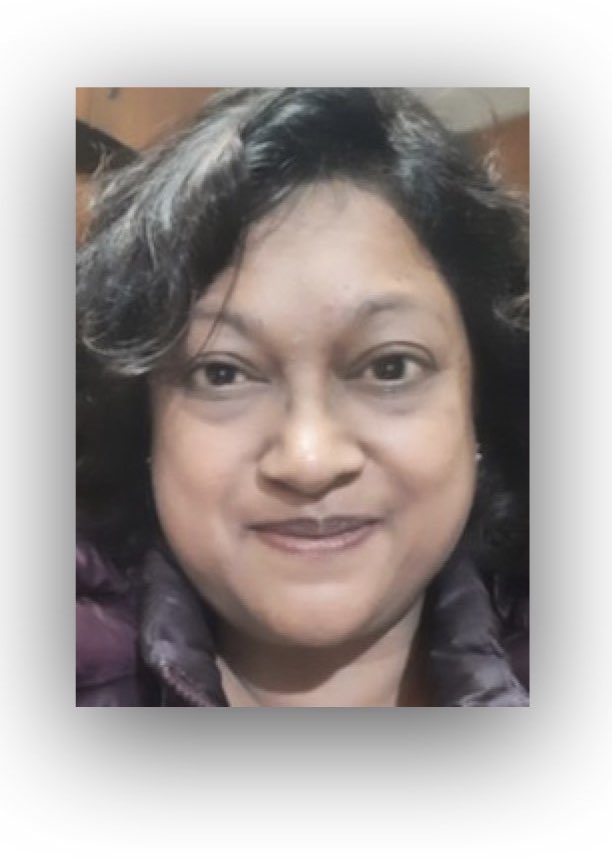
“[A] common perception of conversion, prevalent in India, is that all conversions take place only among deprived lower caste or tribal groups, which are considered more susceptible to allurement or coercion. The reality of upper caste conversions is ignored in this climate of cynicism.”– Dr. Ivy Imogene Hansdak in Pandita Ramabai Saraswati: the convert as ‘heretic’ | More about the effects of “casteism” >>
“The Aryans describe their enemies as dark in complexion, noseless or flat-nosed, of harsh speech, not honouring the Aryan gods, not observing the Aryan religious ritual, but rich in material possessions and living in fortified cities. They are named Dāsas, Asuras, Panis and Kīkatas. The Aryan invaders finally triumphed over the non-Aryans, many of whom were killed, enslaved or driven further inland. In this land, which the Aryans conquered from their enemies, were founded the early Aryan settlements.” – B.G. Gokhale in Ancient India (Bombay, 1959 ed.), p. 22 | Up-to-date Safe search results: “Adivasi tribal bondage slavery trafficking” >>
All subjects will thus be equal in the eyes of the law. But every single individual will be free to pursue his own religion without hindrance, so long as it does not transgress the common law. The question of the ‘protection of minorities’ is not good for me; it rests upon the recognition of religious groupings between citizens of the same state. What I wish India to do is to assure liberty of religious profession to every single individual. Then only India can be great, for it was perhaps the one nation in the ancient world which had recognized cultural democracy, whereby it is held that the roads to God are many, but the goal is one, because God is one and the same. In fact the roads are as many as there are individuals in the world.
Source: Vinay Lal blog “Gandhi, Secularism, and Cultural Democracy” (2 October 2020)
URL: https://vinaylal.wordpress.com/2020/10/02/gandhi-secularism-and-cultural-democracy/
Date visited: 4 October 2020
“We have no word for Nation in our language. When we borrow this word from other people, it never fits us.” – Letter from Rabindranath Tagore | Rabindranath Tagore: a universal voice – Unesco >>
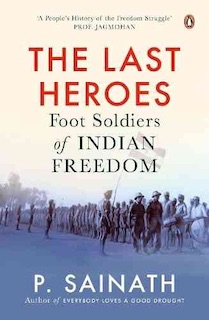
Adivasi | Books | Publishers >>
History | Success stories >>
The defence that the government is not responsible for the present crisis has consequences for India’s democracy […]
The scenes that are being witnessed in India now are apocalyptic in tone. When a citizen attacks hospital personnel because a life was lost due to the absence of medical care, or a citizen struggles to breathe with an oxygen cylinder on the pavement, it is a crisis at multiple levels.
But what is concerning, more than the “collapse of the system” or the failure of the state, is the shocking discourse among the supporters of the government that it is not responsible for the present crisis, arguably, India’s gravest hour. This defence has consequences for India’s democracy. […]
When ordinary people, without access to expert advice, are asked to own up to their mistakes, powerful actors such as the Election Commission of India holding an eight-phase election in Bengal, the Uttarakhand Chief Minister justifying the Kumbh mela and the Prime Minister exulting about the size of an election rally crowd in West Bengal on a day when over 2,00,000 Indians were newly infected by the novel coronavirus, are all unassailable actions of the state. […]
In the last seven years, the Indian state has acquired distinct tendencies of what sociologist Max Weber has called patrimonialism in which the ruler exercises a traditional form of authority which rests on the “sanctity of immemorial traditions”, in contrast to a rule based on a rational-legal bureaucracy or impersonal rules. But unlike in ideal typical patrimonialism, this highly personalised and centralised form of rule is not based on heredity, kinship ties or personal allegiances, rather on the ideology of religious majoritarianism as well as nationalism, and legitimised by election wins. […]
Unless people become citizens and not subjects under a patrimonial rule, the calamitous clouds of the pandemic portend a bleak future for Indian democracy as well.
Source: “Social murder and the missing state” by Nissim Mannathukkaren (Chair, International Development Studies, Dalhousie University, Canada), The Hindu, 7 May 2021
URL: https://www.thehindu.com/opinion/lead/social-murder-and-the-missing-state/article34502018.ece
Date visited: 7 May 2021
“If we wish to maintain democracy not merely in form but also in fact … we must observe the caution which John Stuart Mill has given all those who are interested in the maintenance of democracy: namely, not to lay the liberties at the feet of even a great man, or to trust him with powers which enable him to subvert their institutions.
Hero-worship is a sure road to degradation and to eventual dictatorship.” *
The Sovereign Republic of India was formally proclaimed on January 26, 1950, governed by a constitution which guaranteed
The State shall not deny to any person equality before the law
The State shall not discriminate against any citizen on grounds of religion, race, caste, sex
‘Untouchability’ is abolished and its practice in any form is forbidden.
Source: Gita Mehta (*quoting Dr Ambedkar) in Snakes and Ladders: A View of Modern India (Minerva 1997 ed.) – pp. 92-93
India, a union of states, is a Sovereign, Secular, Democratic Republic with a Parliamentary system of Government | Learn more >>
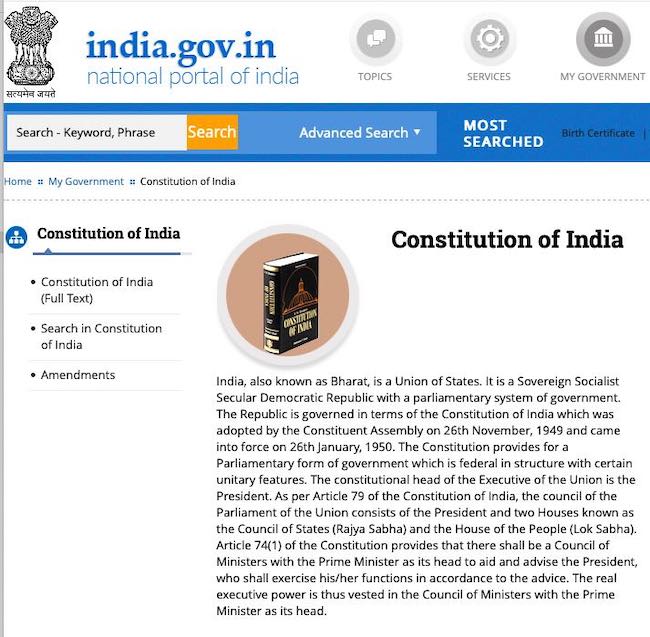
About the preamble to the Indian Constitution
We could use the preamble to the Constitution to measure how we have done as a sovereign nation. The preamble sets out objectives of securing to all citizens social, economic and political justice; liberty of thought, expression, belief, faith and worship; equality of status and of opportunity, and aims to promote fraternity and ensure the unity and integrity of the Nation.
Proving western sceptics wrong, democracy has survived and thrived in India. The success of the Indian Constitution lies in the fact that the institutions it created — Parliament, Supreme Court, Election Commission or the Comptroller and Auditor General of India — have broadly functioned well. True, the entire electoral system is crying out for reforms and unfortunately, it’s coming from the Supreme Court and not the political class.
Source: Their greatest work: How Indians made Constitution a success, Column by Chanakya | Hindustan Times, 29 November 2015
Address: https://www.hindustantimes.com/columns/the-constitution-of-india-on-the-front-shelf-of-the-nation-s-library/story-ze7NGQQurWIZhy6fttG23K.html
Date Visited: 30 December 2021
Historian Romila Thapar on academic freedom, nationalism, sedition, and free speech.
A widely respected public intellectual, Romila Thapar has groomed generations of students in Jawaharlal Nehru University (JNU), and earlier in Delhi University. Frank in her views, she insists that in the given climate where people’s nationalism is questioned merely on the basis of a slogan or two, as in the case of JNU, the primary identity of every “citizen of India, over and above all other identities of religion, caste, language, race and suchlike,” is that of an Indian. […]
A society whose ambience is suffused with fear ceases to nurture creativity and its life is reduced to a routine banality. […]
There seems to be a growing attempt to dismantle institutions where creativity in thought is encouraged. In most cases, new appointments to positions of authority have been made of people who were chosen because they are not associated with the kinds of ideas that explore new avenues of thought and work, or that encourage the questioning of existing ideas, and because they are likely to carry out instructions from the ministries. So far at least, this has been the pattern. […]
Attempts to silence free speech are, of course, always characteristic of governments that lack confidence and are uncomfortable with an independent citizenry. […]
Hindus, Muslims, Christians, Dalits and Adivasis are all equal citizens. All citizens have the right to debate and discuss their duties towards the state and also the obligations of the state to ensure that the claims to human rights of all citizens are met by the state to an equal degree.
Source: “‘Nationalism does not allow the Hindu in India to claim primacy” by Ziya Us Salam, The Hindu, 2 March 2016
Address: https://www.thehindu.com/opinion/op-ed/historian-romila-thapar-says-nationalism-does-not-allow-the-hindu-in-india-to-claim-primacy/article8300752.ece
Date Visited: 15 April 2021
Excerpts from an interview with historian Romila Thapar by Karan Thapar held on 10 August 2022 | Read the full transcript in The Wire >>
Karan Thapar: Romila, in 1947, you were just 15. What did independence mean for you? What were your dreams and expectations?
I regarded myself and my generation as having grown up on what I always refer to as the cusp of independence, so there were immense expectations. The expectations were largely of the imminence of something exciting that was going to change our society and make us into a new people from what we had been as colonised subjects. So there was tremendous excitement; excitement of a kind that drew in contemporary events and one’s thoughts about them. […]
Karan Thapar: So India’s diversity wasn’t its weakness, it was its strength.
It was its strength. And I think that, you know, we misunderstood a lot of the Indian tradition back then, by making it single, monopolistic, and so on. It’s that spread, it’s that plurality which is really very effective and I know it’s a cliché to say we had plurality. But we must define it in terms of the plurality of living together and the consciousness. […]
Karan Thapar: So the first quality of Nehruvian India was that it was a pioneer age?
It was a pioneer age, and one saw in it everything he did. For one thing of course, he was a very dignified politician. We’ve never had a prime minister that was so dignified. […]
Karan Thapar: It sounds as if you are suggesting that India under Modi’s Hindutva and Hindu nationalism is a reversal of the ideals and cherished traditions of the preceding 67 years.
Well, it’s certainly a reversal of the values and ideals that the Indian national movement for independence stood for. […]
Now, what did this change mean? It is a huge change, which I don’t think we fully understood. Citizenship is a free person. Is a person who has rights, and the rights of what? The rights of a citizen are to water, food, shelter, to education, to health, to employment, to social justice and social equality. […]
Is there a guarantee of food and drinkable water? […]
The poor are forgotten, or they are sidelined, or they are not taken seriously enough. […]
I mean when you say take away their tears that Gandhi talked of, what are we doing with our tribals? We’re making them face a nightmare of corporates coming in and mining the very land that they are cultivating. They’re insecure because they’re holding on to the land that they are cultivating. […]
Karan Thapar: Increasingly, the period from 1200 to 1800 is viewed in terms of religion, and interpreted in terms of a Hindu-Muslim divide. No doubt that accords with the ideology of the ruling establishment of the day, but as a historian, who sees the writing and interpretation of history being almost turned on its head, how do you respond to this?
It begins with colonials coming to India saying “where is your history?”, and not finding the equivalent of the Greek historians and the Chinese historians, and saying “we have to write the history of this country”. So they set out to write the history of this country. They write about many things which have come up to the surface, which we’re contesting.
One, James Mill, for example, writes about there were two nations in India, the Hindu nation and the Muslim nation. And he uses the word ‘nation’, and they are constantly in conflict. James Mill 1870, The History of British India. That statement is repeated again and again and again by colonial writers. Historians, writers, everybody. It’s picked up by the Indian middle class and becomes part of the fundamentals of the history of the second millennium AD. […] Then you start analysing the history of that one millennium, and find that Mill was hopelessly wrong. This is not what was there. […]
[W]here’s the evidence for talking about a Hindu nation and a Muslim nation? There’s nothing. If you say that the Muslims, as is said by Hindutva today, the Muslims victimised the Hindus, and therefore, we have had 1,000 years of slavery, and you know, many dramatic statements of that kind are made, when you look at the texts and the sources, you find that there are all kinds of mixtures going on. Artisans and craftsmen repairing the Qutub Minar in Delhi have little inscriptions saying, “I, Bhondu, Dhodu, Hundu, Handu”, all of these pet names that people had, are masons who repaired this destruction over here, and we are very grateful to our God Vishwakarma for helping us. Inside the Qutub Minar.
Karan Thapar: So what Hindutva is doing today, and has been doing for the last six, eight years, is to read back Mill’s interpretation of Indian history, which was untrue in 1870 when he wrote it, but then are reading it back six centuries to reinterpret the past.
I mean, what is really happening, to put it in a nutshell, is the revival of the colonial history of India, by pretending that this is the indigenous history. […]
History is an attempt to understand and explain what happened in the past, so as to understand the present better. So, you go for evidence, and it has to be reliable. You can’t say ‘such and such a God came and then this happened’ or ‘such and such a Rishi had supernatural powers and this happened’. [I]t’s a strong attempt to undo history because fortunately, so far, we do have some excellent young historians who are not buying this. […]
I’ve been heavily heavily attacked in the worst, in the most disgusting of ways, because I am a woman and you know, women are easy targets, especially for sexist attacks. And I’ve been heavily attacked, but I still maintain that the history that is being propagated as ‘Hindutva history’ is not history. […]
History is becoming a cataclysm. You’re given a question and you are given an answer. You stick with that question and you stick with that answer, don’t ask another question and don’t look for another answer. Which is why one is so worried about the New Education Policy. […]
Source: Karan Thapar interviewing Romila Thapar (Emeritus Professor of History, Jawaharlal Nehru University) in “I Don’t Like Modi’s India, It Is Too Narrow and Limited”, The Wire, 12 August 2022
URL: https://thewire.in/history/full-text-karan-romila-thapar-modi-independence
Date Visited: 17 August 2022
Since his election in 2014, Mr. Modi has presided over the consolidation of a Hindu-majoritarian politics, systematically concentrated power in the hands of the executive and clamped down on political dissent. The Modi government’s onslaught against minorities, freedom of the press and the independence of the judiciary has been relentless.
Source: Meenakshi Ahamed in “In India, the case of a missing U.S. ambassador”, Opinion (New York Times international print ed., 23 December 2022)
The violence that erupted two weeks ago between Muslims and Hindus in the English city of Leicester, home to a large population of Britons with South Asian ancestry, appears at last to be dying down as police flood the streets. It began with brawls and quickly escalated into attacks on mosques and temples. Much about the lead-up to the “senseless violence”, as local leaders call it, remains obscure. Certainly, both sides bear responsibility. Young hotheads have drunk deeply from the wells of global Islamism or Hindu chauvinism. The mayor pointed to some “very distorted social-media stuff”. Yet the violence was shocking all the same. Leicester had long been a place where people of different faiths rubbed along.. […] Events in faraway Leicester bear on Banyan’s Asian preoccupations, largely because of the reaction of the government of India [whose] diplomats abroad must now promote a Hindu-inflected alternative medicine known as Ayurveda, as well as take instruction in the promotion and practice of yoga [while] intervening in others’ domestic affairs, as India has in Leicester this past month, seems bound to generate friction in future.
Source: “Global guru: India’s government is exporting its Hindu nationalism”, The Economist (EU), 1 October 2022
URL: https://www.economist.com
Date Visited: 3 October 2022
For updates on the above issues by typing matching keywords or the names of renowned historians (e.g. Romila Thapar, Ramachandra Guha and Vinay Lal) in the search window seen below.
13th B R Ambedkar Memorial Lecture on the topic of ‘Conceptualising Marginalisation: Agency, Assertion & Personhood’ by the Indian Institute of Dalit Studies, (IIDS) Delhi and Rosa Luxemburg Stiftung, South Asia
By Supreme Court Judge Justice D.Y. Chandrachud
Tribals are subject to oppression and cruelty even after independence and still picked up by the investigating officers to cover up shoddy investigations […]
The top court judge said even if a discriminatory law is held unconstitutional by the courts, or is repealed by parliament, the discriminatory behavioural pattern is not immediately overturned.
“Constitutional and legal mandates are not sufficient to protect the rights of the marginalised group including Dalit and tribals,” he said.
“The British Raj enacted the Criminal Tribes Act 1871 through which a tribe, gang, or class of persons addicted to the systemic commission of offences were notified. The Criminal Tribes Act was later repealed in 1949 once our Constitution was enacted, and the tribes were ‘de-notified’.”
“However, even after nearly seventy-three years since the tribes were de-notified, the members of the tribes are still subject to oppression and cruelty. Members of the de-notified tribes are still picked up by the investigating officers to cover up shoddy investigations,” Justice Chandrachud said.
Referring to a top court judgement, he said, “This Court in Ankush Maruti v. the State of Maharashtra allowed a review petition filed against the conviction of six accused persons on rape and murder charges.”
“The decision judicially recognised that the members of the nomadic tribes belonging to the lower strata of the society are regularly harassed by investigating agencies by using the forces of criminal law,” Justice Chandrachud said. […]
“However, without the fulfilment of the principle of recognition, the ideals of both formal and substantive equality would not be sufficient to address concerns of freedom. It is only through recognition that our existence as social beings is generated,” he said. […]
“The members of the marginalised communities can also be institutionally humiliated not merely by using the tool of law but also by establishments that further a conducive environment for discrimination and humiliation to be perpetuated. Even if a discriminatory law is held unconstitutional by the Courts, or is repealed by the parliament, the discriminatory behavioural pattern is not immediately overturned,” he said.
Justice Chandrachud said that treating every person as an individual, irrespective of their differences and membership of multiple groups would not be sufficient to gain personhood (status of being a person).
“Hence, members of the marginalised communities would be able to gain complete personhood only by assertion and recognition of their group identities. The international framework and the Indian Constitution facilitate this approach, of identifying an individual as a member of the group to remedy marginalisation.” […]
Justice Chandrachud said combating something as prevalent and deep-rooted as marginalisation is no easy task, and does not have solutions.
“The only recourse available to us is to faithfully abide by and give life to the constitutional ideals which Dr Ambedkar helped formulate, and use those to bring transformative change in the minds and perceptions of the society,” he said.
Source: ‘Members of De-Notified Tribes Picked Up to Cover Up Shoddy Investigations’: Justice Chandrachud, The Wire, 7 December 2021
URL: https://thewire.in/rights/members-of-de-notified-tribes-picked-up-to-cover-up-shoddy-investigations-justice-chandrachud
Date Visited: 30 December 2021
[Bold typeface added above for emphasis]
“The practice of religious rituals, ceremonies and sanctions by specific cultural groups allow such sacred landscapes to be maintained, emphasizing that humans are intrinsically part of the ecosystem. Taboos, codes and customs specific to activities and community members restrict access to most sacred groves. […] The inclusion of local people’s needs and interests in conservation planning is increasingly accepted as essential, both to promote the well-being of human populations, and to ensure that biodiversity and conservation needs are met in the long-term.” – Nazir A. Pala, Ajeet K. Neg and N.P. Todaria in “The Religious, Social and Cultural Significance of Forest Landscapes in Uttarakhand Himalaya, India” (International Journal of Conservation Science, Vol. 5, Issue 2, April-June 2014) | Sacred groves | Biodiversity and development – Himalaya >>
Brought up in a system in which all communications are by word of mouth, and hence used to trusting verbal statements, tribal populations get confused by constant reference to documents and written rules, which increasingly determine all aspects of rural life.
Tribes of India: The Struggle for Survival >>
Up-to-date reports by Indian journalists and commentators
To search Indian periodicals, magazines, web portals and other sources safely, click here. To find an Indian PhD thesis on a particular tribal community, region and related issues, click here >>
Search tips
Combine the name of any particular state, language or region with that of any tribal (Adivasi) community.
Add keywords of special interest (music, poetry, dance just as health, sacred grove and biodiversity); learn about the rights of Scheduled Tribes such as the “Forest Rights Act” (FRA); and the United Nations “Declaration on the Rights of Indigenous Peoples”, “Universal Declaration of Human Rights”, “women’s rights”, or “children’s right to education”.
Ask a question that includes “tribal” or “Adivasi”, for instance: “Adivasi way of life better?” (or “tribal way of life worse?”)
Specify any particular issue or news item (biodiversity, bonded labour and human trafficking, climate change, ecology, economic development, ethnobotany, ethnomedicine, global warming, hunter-gatherers in a particular region or state, prevention of rural poverty, water access).
For official figures include “scheduled tribe ST” along with a union state or region: e.g. “Chhattisgarh ST community”, “Himalayan tribe”, “Scheduled tribe Tamil Nadu census”, “ST Kerala census”, “Particularly Vulnerable Tribal Group Jharkhand”, “PVTG Rajasthan”, “Adivasi ST Kerala”, “Adibasi ST West Bengal” etc.
In case the Google Custom Search window is not displayed here try the following: (1) toggle between “Reader” and regular viewing; (2) in your browser’s Security settings select “Enable JavaScript” | More tips >>
Note: hyperlinks and quotes are meant for fact-checking and information purposes only | Disclaimer >>
See also
Adverse inclusion | Casteism | Rural poverty
Childhood | Tribal Children’s Right to Education in India
Demographic Status of Scheduled Tribe Population of India (Census figures 2011)
Fact checking | Figures, census and other statistics
Human Rights Commission (posts) | www.nhrc.nic.in (Government of India)
Search tips | Names of tribal communities, regions and states of India
“What is the Forest Rights Act about?” – Campaign for Survival and Dignity
“Who are Scheduled Tribes?” – Government of India (National Commission for Scheduled Tribes, NCST)
